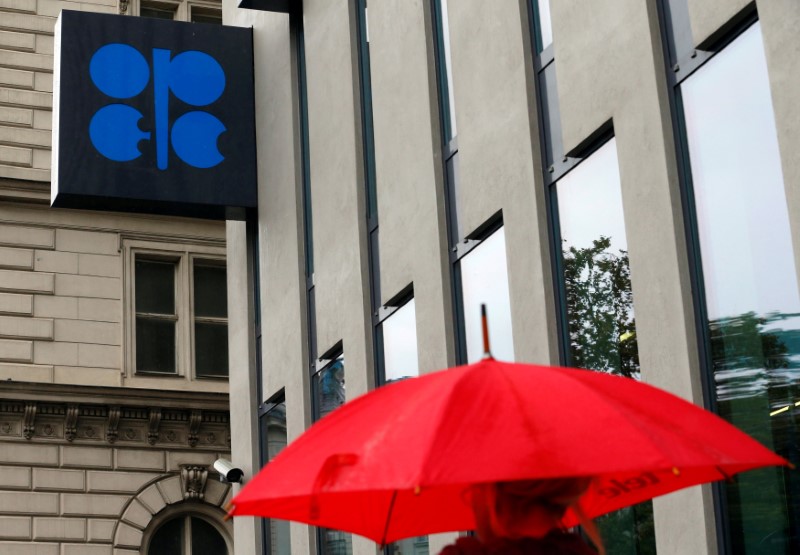By Rania El Gamal and Ron Bousso
ISTANBUL (Reuters) - OPEC's top oil producer Saudi Arabia said on Monday a global production deal to limit supplies could be reached by the group's next formal meeting in November, when an invitation to join cuts could be extended to non-OPEC nations such as Russia.
"OPEC needs to make sure we don't crimp too tightly and create a shock to the market. We are going to be very responsible," Saudi Arabia's Energy Minister Khalid al-Falih told the World Energy Congress in Istanbul, adding that OPEC needed to behave in a balanced and responsible manner.
Last month in Algiers, the Organization of the Petroleum Exporting Countries agreed modest oil output cuts. The goal is to cut production to a range of 32.50-33.0 million barrels per day (bpd). OPEC's current output
"Prices have dropped too low and that has impacted investment. Many companies and countries are hurting ... we don't want to give the market the wrong signal and shock the market's prices," Falih said, adding he was optimistic that the deal could be reached next month.
Non-OPEC oil producer Russia's President Vladimir Putin welcomed the global cut invitation, saying Moscow was ready to join the proposed cap on oil output by OPEC members.
Putin said low oil prices had led to underinvestment in the global energy sector which would turn into a deficit at some point and trigger new "unpredictable jumps" in prices.
"That's why in the current situation we think that (an oil output) freeze or even an oil production cut is likely to be the only right decision to maintain the stability of the global energy sector," Putin said, hoping that OPEC members would confirm the decision to adopt quotas for output in November.
"Russia is ready to join the joint measures to cap production and is calling for other oil exporters to join."
Brent crude prices rose to their highest in a year on Monday after Russia said it was ready to join a proposed deal to cap oil output in a bid to stem a two-year price slide.
Global benchmark Brent crude futures (LCOc1) reached the highest since Oct. 12, 2015 at $53.22 a barrel at 1335 GMT, up $1.29 on Friday's close. U.S. futures (CLc1) also gained ground, reaching a four-month high of $51.10 a barrel.
DELICATE AND CRITICAL
However, the delicate and critical issue of how much each of the 14 OPEC members will produce, is to be decided at the November formal OPEC meeting. Putin did not say at what level Russia would be ready to cap its production.
Iran, with a heavily oil-reliant economy, believes its fair production share in OPEC should be higher than its current output and has accelerated its efforts to reach its production before 2012, when the European Union imposed additional sanctions on the country for its nuclear activities.
Sanctions were eased in January in return for Iran curbing its nuclear programme under a landmark deal reached between Iran and six major powers in 2015.
Between 2012 and 2016, Saudi Arabia and other Gulf OPEC members have raised output to compete for market share with higher-cost producers such as the United States. Saudi output has risen to 10.7 million bpd from 10.2 million in recent months due to local needs for summer cooling.
No decision is expected in Istanbul, OPEC sources have said, but it is a chance for officials to discuss the next steps after the Algiers deal, which was agreed after intensive shuttle diplomacy.
Falih said Saudi Arabia would be prepared to deal with whatever price may emerge.
"We have economic and fiscal plans to deal with very low (price) scenarios and moderate price scenarios," he said.
Falih said there was still not total clarity on supply and demand in some areas such as China and North America at the moment and that he hoped the situation would be clearer by the time of OPEC's Nov. 30 meeting.
"It is time to do something different than we faced in 2014. It is a very gentle hand on the wheel, we are not doing anything dramatic ... The difference is that the market forces have shifted significantly between 2014 and now."
Russia's energy ministry said on Friday an output freeze deal could be reached before the OPEC meeting..
Algerian Energy Minister Nouredine Bouterfa said he expected to see commitments on supply cuts from non-OPEC oil producers, describing the Istanbul gathering as "consultations".
Venezuelan President Nicolas Maduro also hoped for "fairer and more realistic" global oil prices, adding that Venezuela was ready to be part of any alliance among oil producer countries.

"OPEC members should reach an agreement and should work for the stability of the oil industry. Prices must be fairer, more realistic, and they should be an incentive for investors. For that we need fair prices," Maduro told the Congress in Istanbul, according to a translation of his comments.